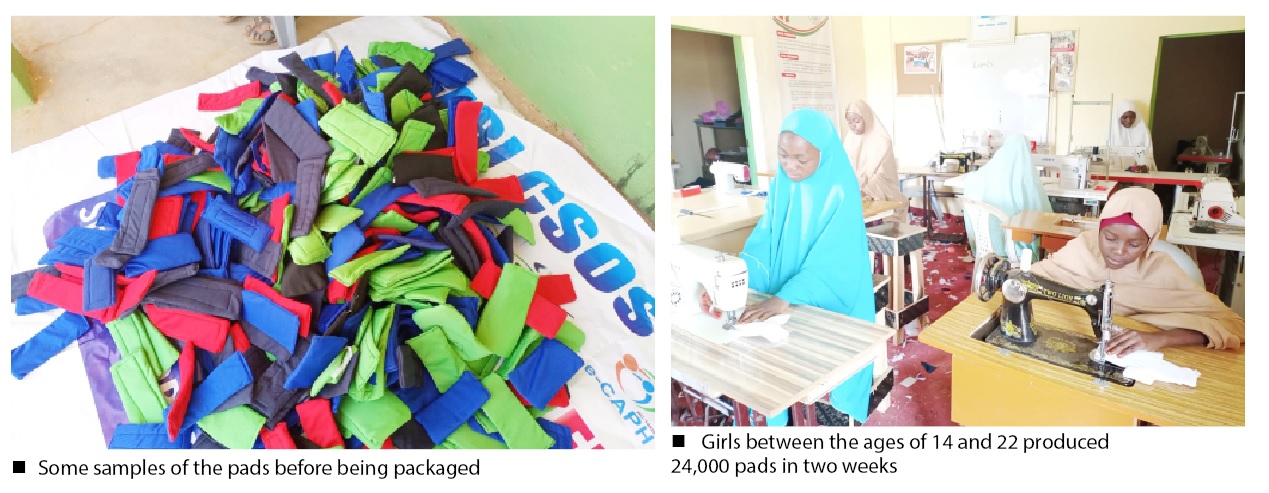During the COVID-19 lockdown in Kaduna State, one of the major concerns for Farida Muhammad, 15, was where to get pads.
As a teenager, she relies on her parents for her needs but with her dad not working for over two months due to the lockdown, asking for money to buy pads became daunting, especially since he had been struggling to feed the family.
- World Bank counters FG, says 7m Nigerians plunged into poverty
- Tegina pupils: Parents beg for money in Churches, Mosques as bandits reduce ransom
When she confessed her concerns to her mother, she told her to use rags to contain the flow.
Farida’s situation is what is termed period poverty due to her inability to procure safe sanitary pads for her monthly menstrual cycle. In such scenarios, the use of rags and other unsafe methods tend to be the only option. Yet experts say this can lead to urinary tract infections, vaginal infections and rashes.
Farida’s case is not peculiar in Kaduna as during the lockdown, a survey by a community group, Enhancing Community Action for Peace and Better Health Initiatives (e- caph), found out that the lockdown placed a huge burden on girls in catering for their menstrual flow as pads are expensive and most girls can’t afford enough to take them through their period.
It was gathered that a pack containing six pads is sold at about N500 with two or three packs to suffice for a menstrual cycle.
A stitch to save blood and shame
The survey led to a written proposal by e-caph to the United Nations Population Fund (UNFPA) and under its Risk Communication and Community Engagement project (RCCE) it intervened by sponsoring 150 girls to learn how to sew their own pads.
The project was under the UN Basket Fund support to COVID-19 Response in the state
At the unassuming office of e-caph in Rigasa, a community on the outskirt of Kaduna, populated with low-income families, there was satisfaction among the girls selected for the programme.
Dotted with sewing machines, bought with funds from UNFPA, and pieces of fabrics the girls had used to sew pads, this shop gives the girls a chance to provide pads for themselves and help other girls access cheap, affordable and reusable pad.
Daily Trust learnt that the material used for the pads are sourced locally.
The pad, made from fabric and cotton, takes five minutes to sew. They stitch it with patterns that make it attractive and appealing to the users.
“When we get the fabric, it is cut into the curved shape of a pad,” Lubabatu Musa, who is the coordinator of the project, said.
“Getting the perfect curve is important as the cotton will be laid on it to give the pad texture. Thereafter the core, which is made from foam, is inserted into another fabric before being sewn together with the curved fabric,” she explained.
Jamila Ibrahim took three weeks to learn sewing after her parents encouraged her to.
“When I informed my parents that I wanted to apply for the programme, they told me that I will be able to do it because I am the hardworking type. I knew how to sew before so I faced little challenges,” she said.

The 14-year-old expressed delight in her work as she hopes to help other girls purchase affordable pads.
Bilkisu Sani, 22, said her seven-week experience making pads has been fruitful.
“I feel gratified knowing that I am doing this to provide succour for those who do not have the wherewithal to buy pads. Since menstruation is monthly, antiseptic is all that is needed to make the pad reusable. It is washed and dried in the sun. It is advisable to wash it under running water,” she said.
She said if properly cared for, the pads can be used for up to six months.
For Fatima Alhassan impacting lives through making reusable pads has been a great achievement.
“It is very affordable as it comes in a pack of six. The ones in the market contain seven and can be used once since some girls can have menstrual flows two to three times in a day,” she said.
She hopes the government extends assistance to the programme so more girls benefit from it.
Why reusable pads
The Executive Director of e-caph, Yushau Muhammad Abubakar, explained that it went into the production of the reusable pads to see that young girls are empowered to take charge of their reproductive health decisions.
Having advocated for reproductive health for years in Kaduna, Abubakar found out that girls in urban slums and rural areas have a lot of issues concerning pads.
“So, we think it is high time for us to be able to come in and rescue these girls by providing alternatives for them. Not just to get the pads but to earn income,” he said.
He said the girls between 14 and 22 years have produced 4,000 packs containing 24,000 pads in two weeks, making them the highest producers of reusable pads in the north. Already they are trying to deliver on the orders they have received.
“It is a great achievement as they can now depend on themselves. We are hoping to do more and for people to see the impact of the programme on the lives of these young girls and for them to continue to support the process. The process is open and we are calling for partnership and other support to be able to do more of this life-saving programme in the rural communities,” he said.
The coordinator of the project, Lubabatu Musa, told Daily Trust that feedback from those who used the pads has been positive adding that when the pads go out for sale, it would cost N500. The batch produced now have been purchased by Non-Governmental Organizations (NGOs) to distribute to vulnerable and destitute girls.
“I also use it and it feels great on me. I spend less on pads now since I make them myself,” she said.
Mariama Darboe, Head of Office, UNFPA in Kaduna, agreed that with over two million females within the age bracket of 10 to 50 years in the state, going commercial with the pad offered a huge market for the products.
She said, “When they earn the money, they have a revolving fund of wealth as we don’t want them to rely on external aids.”
Concerns with reusable pads
However, the reusable pads will face a tough challenge in the market as some women who spoke to our reporter said they are not comfortable washing impurities emanating from them.
Sofia Lawal, a mother of two, said the sight of her menstrual blood is irritating to her and she would not want to wash it with her hands.
“After a menstrual flow, I throw out the pad I use. The reusable pad is a good initiative but I can’t buy it because washing it will be disgusting to me,” she said.
Temitope Agboola echoed the same sentiments.
“Most girls are afraid of the sight of blood so it will be hard for those who have the means to buy the mainstream pads to go for the reusable. For me, I am used to disposing of my pads after usage by removing the inner part to flush down the sewage while I burn the outer part.”
But Darboe urged girls to embrace their body features in a dignified and confident way stating that they should not be ashamed of what comes out of them.
“The blood that comes out during menstruation is not dirt, it is natural blood that shows they are fertile. There’s nothing wrong with it, only that we have myths and misconceptions about it, so we need to make young girls like their body and themselves,” she said.
She added that the process of disposing mainstream pads is not good for the environment and the reusable ones provide a safer alternative for the environment.
Lubabatu is hopeful that since reusable pads do not contain chemicals that may be harmful to users, attitudes towards them may change.

 Join Daily Trust WhatsApp Community For Quick Access To News and Happenings Around You.
Join Daily Trust WhatsApp Community For Quick Access To News and Happenings Around You.


